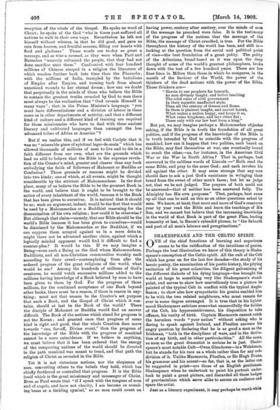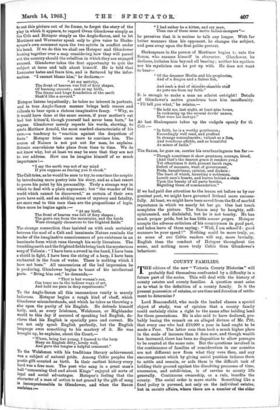SHAKESPEARE AND THE CELTIC SPIRIT.
ONE of the chief functions of learning and experience seems to be the ratification of the intuitions of genius. Perhaps the best illustration we know of this theory is Shake- speare's conception of the Celtic spirit. All the cult of the Celt which has gone on for the last few decades—the study of his heroic poetry, the examination of his poetic history, the pitying recitation of his great calamities, the diligent galvanising of the different dialects of his dying language—has brought the world at large to something very like Shakespeare's stand- point, and serves to show how marvellously true a picture he painted of the typical Celt in conflict with the typical Anglo- Saxon ; to show also how sympathetic his genius enabled him to be with the two related neighbours, who must remain for ever in some degree estranged. It is true that in his lighter mood Shakespeare satirises somewhat unmercifully the foibles of the Celt, his hypersensitiveness, his disposition to take offence, his vanity of birth. Captain Macmorris cannot catch the harmless words "your nation" without asking who is daring to speak against Ireland, and Fluellen answers his angry question by declaring that he is as good a man as the Irishman, "both in the disciplines of wars, and in the deriva- tion of my birth, and in other particularities." All the same, as soon as the great dramatist is serious he is just. Shake- speare's most notable Celt—Owen Glendower—is a Welshman, but he stands for his race as a whole rather than for any sub- division of it. Unlike Macmorris, Fluellen, or Sir Hugh Evans, his grammar and his accent—so far, that is, as the latter can be suggested in print—are those of an English gentleman. Shakespeare when he undertook to paint his portrait under- took to paint a great picture, and discarded all those badgP-a of provincialism which serve alike to amuse an audience and spare the artist.
Just as a literary experiment, it may perhaps be worth whilti to cut this picture out of its frame, to forget the story of the play in which it appears, to regard Owen Glendower simply as the Celt and Hotspur simply as the Anglo-Saxon, and to let Mortimer and Worcester speak only to give voice to Shake- speare's own comment upon the two spirits in conflict under his hand. If we do this we shall see Hotspur and Glendower leaning together over a map considering how they will parcel out the country should the rebellion in which they are engaged succeed. Glendower takes the first opportunity to quit the subject at issue and talk about himself. He is told that Lancaster hates and fears him, and is flattered by the infor- mation. "I cannot blame him," he declares,—
" At my nativity, The front of heaven was full of fiery shapes, Of burning cressets ; and at my birth, The frame and huge foundation of the earth Shak'd like a coward."
Hotspur listens impatiently; he takes no interest in portents, and in true Anglo-Saxon manner brings both reason and ridicule to bear upon a riotous imaginative fancy. "Why, so it would have done at the same season, if your mother's cat had but kitten'd, though yourself had never been born," he argues. Glendower merely repeats his words, showing, to quote Matthew Arnold, the most marked characteristic of his race,—a tendency to "reaction against the despotism of facts." Hotspur tries once more to convince him. The course of Nature is not put out for man, he explains. Seismic convulsions take place from time to time. We do not know why, but at least we may be sure that they are not to our address. How can he imagine himself of so much importance !— "I say the earth was not of my mind
If you suppose as fearing you it shook."
The Celt tries, as he would be sure to try, to convince the sceptic by introducing more poetry into his story, and as a last resort to prove his point by his personality. Truly a strange way in which to deal with a plain argument; but "the wonder of the world which cannot be discovered," as certain of their own poets have said, and an abiding sense of mystery and fatality, are more real to this race than are the propositions of logic.
Once more he begins again :— "At my birth,
The front of heaven was full of fiery shapes ; The goats ran from the mountains, and the herds Were strangely clamorous to the frighted fields."
The strange connection thus insisted on with such certainty between the soul of a Celt and inanimate Nature reminds the reader of the imaginative consciousness of pre-existence in an inanimate form which runs through his early literature. The trembling earth and the frighted fields bring back the mysterious song of Taliesin "I have been a sword in the hand, I have been a shield in fight, I have been the string of a harp, I have been enchanted in the foam of water. There is nothing which I have not been." All unconscious of the bad impression he is producing, Glendower begins to boast of his intellectual parts. "Bring him out," he demands,—
" That is but woman's son, Can trace me in the tedious ways of art, And hold me pace in deep experiments."
To the Anglo-Saxon all this unconscious vanity is merely ludicrous. Hotspur begins a rough kind of chaff, which Glendower misunderstands, and which he takes as throwing a slur upon the purity of his English. He defends himself hotly, and, as every Irishman, Welshman, or Highlander would to this day if accused of speaking bad English, de- clares that his English is specially pure and correct. He can not only speak English perfectly, but the English language owes something to his mastery of it. He was brought up, he explains, about the Court,—
"Where, being but young, I framed to the harp Many an English ditty, lovely well,
And gave the tongue a helpful ornament."
To the Welshman with his traditions literary achievement was a subject of natural pride. Among Celtic peoples the poetic gift counted as birth. In their earliest history every bard VMS a free man. The poet who sang in a great man's hall "concerning God and about Kings" enjoyed all sorts of legal and social advantages. Hotspur's feeling that the character of a man of action is not graced by the gift of song
is incomprehensible to Glendower, and when the Saxon exclaims
"I had rather be a kitten, and cry mew, Than one of these same metre ballad-mongers"-
he perceives that it is useless to talk any longer. With far better manners than his opponent, he changes the subject, and goes away upon the first polite pretext.
Shakespeare in the person of Mortimer begins to rate the Saxon, who excuses himself in character. Glendower, be declares, irritates him beyond all bearing ; neither his egotism nor his mysticism can he put up with. He does not want to bear-
" Of the dreamer Merlin and his prophecies, And of a dragon and a finless fish,
And such a deal of skimble-skamble stuff As puts me from my faith."
It is enough to make a man an atheist outright! Details
of Glendower's native grandeurs bore him insufferably.
" tell you what," he relates,—
" He held me, last night, at least nine hours, In reckoning up the several devils' names, That were his lackeys."
At last Shakespeare takes up the cudgels openly for th Cell :—
" In faith, he is a worthy gentleman; Exceedingly well read, and profited
In strange concealments ; valiant as a lion,
And wondrous affable, and as bountiful As mines of India."
The Saxon, he goes on, carries his overbearingness too far :— "Though sometimes it show greatness, courage, blood,
(And that's the dearest grace it renders you,) Yet oftentimes it doth present harsh rage, Defect of manners, want of government, Pride, haughtiness, opinion, and disdain: The least of which, haunting a nobleman,
Loseth men's hearts, and leaves behind a stain
Upon the beauty of all parts besides, Beguiling them of commendation."
If we had paid due attention to the lesson set before us by our greatest poet, we might have governed Ireland more success- fully. At least, we might have been saved from the fit of morbid repentance in which we nearly let her go. One last touch completes the picture. The Saxon may be haughty, self- opinionated, and disdainful, but he is not touchy. He has much proper pride, but he has little amour prapre. Hotspur accepts the adverse criticism of his countrymen in good part, and takes leave of them saying: "Well, I am school'd : good manners be your speed ! " Nothing could be more truly, or, as some of our Celtic readers will say, more brutally, English than the conduct of Hotspur throughout the scene, and nothing more truly Celtic than Glendower's behaviour.











































 Previous page
Previous page